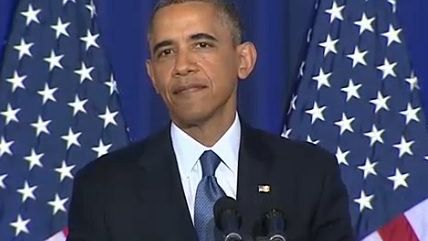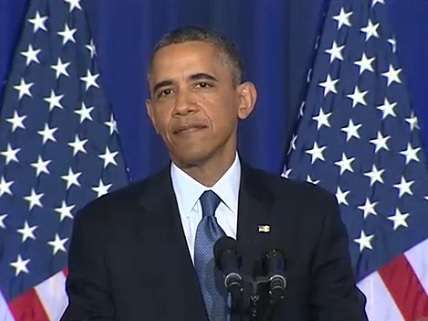Obama's War on Terror By Some Other Name
Meanings contingent on convenience


After he first took office, President Obama jettisoned the use of the phrase "global war on terror," preferring 'overseas contingency operation.' In remarks on his counterterrorism policy (or what he'd like it to be?) to the National Defense University this afternoon, Obama insisted America was "still threatened by terrorists," but warned that America "must define the nature and scope of this struggle," otherwise "it will define us." In Obama's view, most of the changes brought about by the American response to 9/11 ("hardening targets, tightening transportation security, and giving law enforcement new tools to prevent terror") were "sound" despite some causing "inconvenience." He acknowledged issues "like expanded surveillance raised difficult questions" about security and privacy, but when talking about compromising "our basic values," only specifically mentions torture and illegal detention, and not, say, the steady erosion of Fourth Amendment rights in the name of security over the last decade.
Nevertheless, even while warning America to define the nature and scope of the struggle against terrorism, Obama managed to expand the definition of the terrorism he believes government must protect Americans from. From the prepared remarks:
Finally, [after Al-Qaeda in Afghanistan and Pakistan and "localized threats" across South Asia and North Africa] we face a real threat from radicalized individuals here in the United States. Whether it's a shooter at a Sikh Temple in Wisconsin; a plane flying into a building in Texas; or the extremists who killed 168 people at the Federal Building in Oklahoma City – America has confronted many forms of violent extremism in our time. Deranged or alienated individuals – often U.S. citizens or legal residents – can do enormous damage, particularly when inspired by larger notions of violent jihad. That pull towards extremism appears to have led to the shooting at Fort Hood, and the bombing of the Boston Marathon.
From a mass shooting motivated by racism to a suicide motivated by government abuse to the Oklahoma City bombing to the Fort Hood rampage (classified an act of workplace violence and not terrorism by the federal government) to the bombing of the Boston marathon, these things seem to fall under the same "counterterrorism policy" rubric for the president as Al-Qaeda in Afghanistan or Yemen, or a local Islamic extremist group in Mali or Nigeria. "Most, though not all, of the terrorism we face is fueled by a common ideology," Obama helpfully adds, referring to Islamist extremists. He compares the intensity of terrorist attacks today to the 1980s and 1990s, suggesting smart counterterrorism policies would prevent a threat of the level of 9/11 to arise again.
The closest Obama comes to a definition of the "war on terror" is when he rejects the term:
We must define our effort not as a boundless 'global war on terror' – but rather as a series of persistent, targeted efforts to dismantle specific networks of violent extremists that threaten America. In many cases, this will involve partnerships with other countries. Thousands of Pakistani soldiers have lost their lives fighting extremists. In Yemen, we are supporting security forces that have reclaimed territory from AQAP. In Somalia, we helped a coalition of African nations push al Shabaab out of its strongholds. In Mali, we are providing military aid to a French-led intervention to push back al Qaeda in the Maghreb, and help the people of Mali reclaim their future.
In cases where "partnerships with other countries" is impossible, the president says, he uses drones. Here he adopts a definition used in the post-9/11 authorization of the use of military force, explaining that government took "lethal, targeted action against al Qaeda and its associated forces." "Associated forces" is a broad term still, but narrower than the one that would allow Obama to choose any act of terror to include in the "struggle" against terrorism. The president defended the killing of Anwar al-Awlaki. He offered that it would be a dereliction of his duty as president not to kill a U.S. citizen who went abroad and was "actively plotting to kill U.S. citizens," (something the common criminal may do too). Obama's description of al-Awlaki as a "chief of external operations" in Al-Qaeda in the Arab Peninsula brings the cleric who dined at the Pentagon in the aftermath of 9/11 under the umbrella of the "associated forces" of the AUMF. The president did not mention the sixteen year old son of al-Awlaki the U.S. also acknowledged killing (though not "specifically targeting), or two other Americans who were identified as victims of drone strikes, one of whom, Jude Mohammed, was indicted on terrorist charges in 2009 (something al-Awlaki and his teenaged son weren't). The lumping of a sixteen year old with a suspected terrorist wanted by the FBI is an illustrative example of the slippery definition of terrorism and its usefulness primarily in defending constitutionally-suspect policies like targeted killings or "expanded surveillance."
